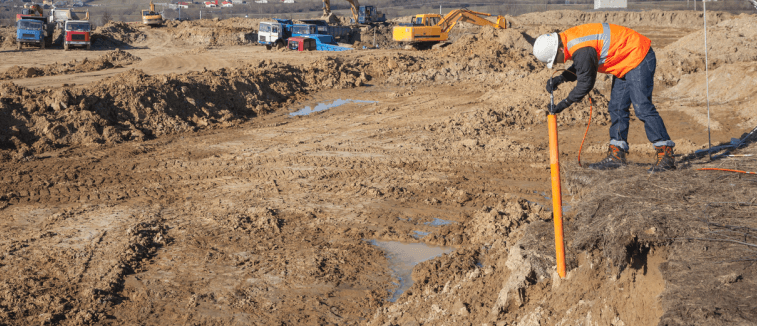Things about Geotheta
Things about Geotheta
Blog Article
An Unbiased View of Geotheta
Table of ContentsThe Only Guide to GeothetaGeotheta Fundamentals ExplainedSome Known Questions About Geotheta.The Main Principles Of Geotheta Getting My Geotheta To Work

With experience and a tried and tested record, you can proceed to senior design duties, job administration placements, and even begin your very own working as a consultant. Continual specialist growth and staying up-to-date with the most recent sector fads and technologies are vital for job progression in this vibrant area. A profession in geotechnical design uses a diverse series of projects and challenges, making sure that no 2 days are the same.
In the workplace, you will certainly evaluate information, prepare records, and work together with other professionals - https://www.imdb.com/user/ur185987626/?ref_=nv_usr_prof_2. Fieldwork includes site check outs, accumulating soil examples, carrying out geotechnical investigations, and looking after building and construction activities. Depending on the task, you might work on-site in varying weather problems and travel to different areas within the UK. As a geotechnical designer, your jobs might consist of site characterization, slope stablizing design, structure design, soil renovation methods, and geotechnical instrumentation and tracking.
The Ultimate Guide To Geotheta
You will likewise communicate with customers, specialists, and governing authorities to deal with any kind of problems and make sure conformity with market criteria and laws. Geotechnical engineering can be challenging, as it includes dealing with intricate soil problems and addressing potential risks to human life and infrastructure. Successfully resolving geotechnical issues and adding to the development of risk-free and sustainable structures can be profoundly rewarding.
If you're taking into consideration an occupation in geotechnical engineering, below are some valuable pointers to assist you attain success: Networking is important for occupation innovation in any kind of field, and geotechnical design is no exception. Joining professional associations, such as the Organization of Civil Engineers (ICE) and the British Geotechnical Association (BGA), can offer networking possibilities, access to sector events and seminars, and valuable resources for specialist development.

Developing strong social and management abilities will set you apart and open doors to career advancement chances - https://geotheta-46958753.hubspotpagebuilder.com/blog/unlocking-the-future-with-top-notch-geotechnical-engineers-at-geotheta. Starting an occupation as a geotechnical designer in the UK uses amazing potential customers and the chance to add to the advancement of the constructed setting. By complying with the academic pathways, acquiring necessary licenses and accreditations, and continually honing your abilities, you can build an effective career in this dynamic field
Geotheta Things To Know Before You Get This
When a person asks what I do and I inform them that I am a geotechnical designer, I normally obtain the follow-up concern of, "What is that?" Geotechnical engineering is a specific branch of civil design that takes care of the scientific research of the mechanics of soil and rock and its applications.
In this post, I will review the function of geotechnical engineering and the kinds of issues geotechnical designers fix. Geotechnical engineers (geotechs) are associated with virtually every type of civil design task. Every structure is supported by soil or rock unless it is floating, flying, or dropping down.
Geotechs are typically most involved at the start of a job. A few of the tasks that a geotech might be in charge of are investigating subsurface conditions, establishing called for laboratory screening of dirt and rock, translating the subsurface expedition results, and creating reports that record the site conditions and offer referrals for structures, fill requirements, incline security, etc.
Usually, individuals do not intend to spend for geotechnical records or layout on smaller tasks, yet the expense of an expert is generally much less costly than spending for substantial foundation repair work in the future. Geotechs are associated with the style of highway cuts and fills, shallow and deep structures, earth preserving structures, embankments, passages, garbage dumps, dams, incline stablizing systems, and pavement subgrades.
The Ultimate Guide To Geotheta

Oftentimes, things that might not seem crucial become crucial years later when problems occur. Consulting Engineers. One last thing to maintain in mind: geotechnical engineering is wed to geology. Despite exactly how terrific your engineering expertise is, if something important is missed out on in the geologic characterization at a website, your knowledge may not save you
Vance, P.E., finished from Marshall College with a Bachelor's Degree in Engineering and received a Master of read review Scientific Research in Civil Design from the University of Illinois at Urbana-Champaign. He is presently pursuing a Ph. D. in Geological Design at Missouri University of Scientific Research and Innovation. Jese works as a geotechnical engineer that specializes in geohazards.
Geotheta for Dummies
Jese lives in West Virginia with his partner and boy. He appreciates crawling around on any type of landslide he can locate and hanging around fly fishing on the water. He can be found on LinkedIn. I wish you appreciated this week's blog post by guest author Jese Vance. If you have an interest in your firm perhaps joining the Civil Design Collective, please contact us here or call us at 800-920-4007.
Anthony Fasano, P.E.Engineering Management Institute Writer of Engineer YourOwn Success. Civil design is the expert engineering discipline that deals with the layout, building and construction and upkeep of public and exclusive facilities within the natural surroundings. Geotechnical engineering is a technique within civil engineering that concentrates on the actions of natural geological products in engineered systems. Geotechnical designers recognize that soil and rock are the least expensive and most plentiful building products on Earth, and subsequently play a major function in the building and construction and efficiency of every kind of civil design framework.
Report this page